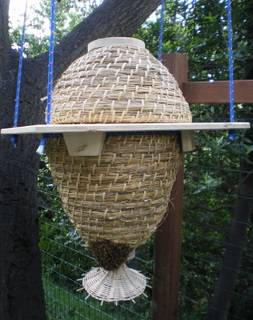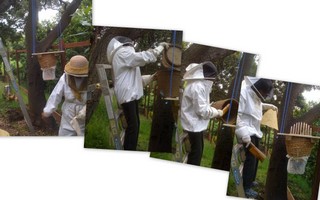 Although I love this poem by Sylvia Plath, in my case it’s more the arrival of the bee egg. My friend Laurie, an amazing creator of natural perfumes among other things, has been keeping bees for several years. She was written up in a new book on Backyard Beekeepers of the Bay Area. I’d been thinking about maybe having bees, and when she told me she had a swarm, I decided to take the plunge. Laurie directed me to a couple of places in Sebastapol that sell “top bar” hives—easier, less honey than commercial bee boxes. I went online to Michael Thiele’s site, read what he says about apiculture, and when I saw the Haengekorb, I was hooked. I called Michael, and this happened to be the only hive he had available at the moment, so I arranged to pick it up yesterday. I was a little perturbed when he told me in the email that I might want to cover it with cow dung(!) but I persevered. When Laurie heard I was going, she wanted to come meet Michael (if you look at any of his online videos, you’ll see why).
Although I love this poem by Sylvia Plath, in my case it’s more the arrival of the bee egg. My friend Laurie, an amazing creator of natural perfumes among other things, has been keeping bees for several years. She was written up in a new book on Backyard Beekeepers of the Bay Area. I’d been thinking about maybe having bees, and when she told me she had a swarm, I decided to take the plunge. Laurie directed me to a couple of places in Sebastapol that sell “top bar” hives—easier, less honey than commercial bee boxes. I went online to Michael Thiele’s site, read what he says about apiculture, and when I saw the Haengekorb, I was hooked. I called Michael, and this happened to be the only hive he had available at the moment, so I arranged to pick it up yesterday. I was a little perturbed when he told me in the email that I might want to cover it with cow dung(!) but I persevered. When Laurie heard I was going, she wanted to come meet Michael (if you look at any of his online videos, you’ll see why).
So we drove up yesterday. It turned out that Leslie, Michael’s wife, helped us, because Michael had a dental emergency. She was terrific, and showed us several hives (one made out of straw (and yes, covered in cow dung) and one made from a hollow log. I asked her if she was familiar with Andy Goldsworthy’s work, and when she said yes, I said “You’re married to the Andy Goldsworthy of bee keeping.” She smiled and said, “I know.”
I asked her about the cow dung, and she said it preserves the hive, and she really didn’t know if was necessary. In any case, on the way home, we passed by a field of cows, and gathered a bucket full of cow plops. It’s a true friend who’s willing to wander a cow pasture and help collect cow dung. But when I talked to Michael that evening, I asked about it. I wasn’t reluctant to use it if I had to, but it seemed a shame to cover the beautiful straw basket with dung. I was relieved when he said it would be fine to use the Haengekorp as is, and if I want to I could cover it a few years down the line. The cow plops will go into the compost.
 In any case, we assembled the hive last night, and this morning at 6 am, before the bees were out, we got the swarm box, and brought it down. We banged the bees into their new home, added the frames, the cloth and beeswax cover, and the top of the hive.
In any case, we assembled the hive last night, and this morning at 6 am, before the bees were out, we got the swarm box, and brought it down. We banged the bees into their new home, added the frames, the cloth and beeswax cover, and the top of the hive.
It went amazingly smoothly.
I was worried that the bees would all want to fly up and it would be hard to assemble frames and coverings on top of them, but they stayed placidly in the bottom of the basket and allowed me to slowly assemble the top of the hive. It was all set up within an hour.
 Now the sun is out, the bees are all in their hive, and I am a beekeeper. Those little dots in the picture are bees. There is something about being around thousands of bees that is very magical. I didn’t feel at all frightened by them. In fact, I went and removed the cheesecloth we’d put around the bottom without my (loaner) bee suit. The bees pay no attention to me. They are intent on their own concerns.
Now the sun is out, the bees are all in their hive, and I am a beekeeper. Those little dots in the picture are bees. There is something about being around thousands of bees that is very magical. I didn’t feel at all frightened by them. In fact, I went and removed the cheesecloth we’d put around the bottom without my (loaner) bee suit. The bees pay no attention to me. They are intent on their own concerns.
I can’t say that I share the exact sentiment of Sylvia Plath’s poem, though I’ve always loved it. The menace she feels from the bees, the ambivalence about her control is as different from my experience as a square wood box is from my egg-shaped basket. Still the imagery is marvelous, and it does convey something of the powerful energy bees emit. As a metaphor for the swarm within, it works perfectly. This was the first long poem I memorized.
The Arrival of the Beebox — Sylvia Plath
I ordered this, this clean wood box
Square as a chair and almost too heavy to lift.
I would say it was the coffin of a midget
Or a square baby
Were there not such a din in it.
The box is locked, it is dangerous.
I have to live with it overnight
And I can’t keep away from it.
There are no windows, so I can’t see what is in there.
There is only a little grid, no exit.
I put my eye to the grid.
It is dark, dark,
With the swarmy feeling of African hands
Minute and shrunk for export,
Black on black, angrily clambering.
How can I let them out?
It is the noise that appalls me most of all,
The unintelligible syllables.
It is like a Roman mob,
Small, taken one by one, but my god, together!
I lay my ear to furious Latin.
I am not a Caesar.
I have simply ordered a box of maniacs.
They can be sent back.
They can die, I need feed them nothing, I am the owner.
I wonder how hungry they are.
I wonder if they would forget me
If I just undid the locks and stood back and turned into a tree.
There is the laburnum, its blond colonnades,
And the petticoats of the cherry.
They might ignore me immediately
In my moon suit and funeral veil.
I am no source of honey
So why should they turn on me?
Tomorrow I will be sweet God, I will set them free.
The box is only temporary.
I read recently that in her layout of the book Ariel, in which this poem first appeared, it was the final poem of the book. This seems to me such a optimistic statement, because the ending “Tomorrow…I will set them free./The box is only temporary” seems so positive. It confirmed for me that her suicide attempt wasn’t meant to succeed. Of course, with her death, Ted Hughes got to rearrange the book as he felt it should be; she wasn’t around to argue one way or the other.
What a great story, Meryl! That was an incredibly fun adventure we had! I love how you just jumped right in and I look forward to these bees sharing their mystery with us.
XOXO~Laurie
I learned so much from this post. I had never heard of Andy Goldsworthy and I had never read the Sylvia Plath poem. Thank you for sharing all these gems from your life and congratulations on being a beekeeper now. Glad you got out of using the manure. : )
Yes, that would have been rather yucky!
O No, cow dung is great stuff!
It can protect your house like stucco.
Or topcoat your driveway.
It can fuel the fire that cooks your food.
At this very moment millions of kids
Are walking behind water buffalos or cows
Waiting for shit to fall.
This makes a great little poem on its own!